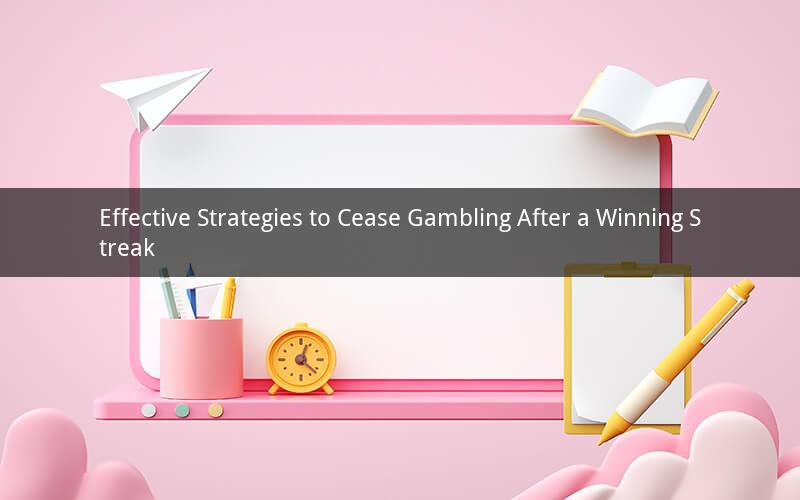
1. Understanding the Psychology Behind Post-Winning Gambling
2. Identifying the Signs of Problematic Gambling Behavior
3. Developing a Strong Support System
4. Implementing Financial Management Techniques
5. Seeking Professional Help for Lasting Change
Introduction:
Gambling can be an exhilarating and thrilling activity, but it's essential to recognize when it has become a problem. Many individuals find themselves caught in a cycle of gambling, often feeling unstoppable after a winning streak. This article explores effective strategies to help individuals stop gambling after winning, ensuring a healthier and more balanced lifestyle.
1. Understanding the Psychology Behind Post-Winning Gambling:
The allure of gambling often stems from the thrill of winning and the hope of achieving even greater victories. After a winning streak, individuals may experience a surge of confidence and a false sense of invincibility. This can lead to a desire to continue gambling, even when it's no longer beneficial. Understanding the psychological factors at play is crucial in overcoming this challenge.
1.1 The Illusion of Control:
One common reason individuals continue gambling after winning is the belief that they have gained control over the outcome. This illusion can be dangerous, as it often leads to further losses. Recognizing that gambling is inherently unpredictable and uncontrollable is essential in breaking the cycle.
1.2 The Gamblers' Fallacy:
The gamblers' fallacy is the misconception that past events can influence future outcomes. For example, if a particular number has not been drawn in a lottery for a while, some individuals may believe it is "due" to be drawn soon. Understanding that each gambling event is independent of previous outcomes is crucial in overcoming this fallacy.
2. Identifying the Signs of Problematic Gambling Behavior:
Recognizing the signs of problematic gambling behavior is the first step in addressing the issue. Here are some common indicators:
2.1 Preoccupation with Gambling:
Individuals may constantly think about gambling, planning their next bet, or reliving past wins. This preoccupation can interfere with daily activities, relationships, and responsibilities.
2.2 Increasing Stakes:
After a winning streak, individuals may feel compelled to increase their bets to recoup previous losses or to continue the winning momentum. This can lead to significant financial strain.
2.3 Lying or Hiding:
Problematic gamblers may lie about their gambling activities or hide their winnings from loved ones. This behavior is often a sign of guilt or fear of judgment.
2.4 Emotional Distress:
Gambling can lead to feelings of anxiety, depression, and frustration. Individuals may turn to gambling as a way to cope with these emotions, further exacerbating the problem.
3. Developing a Strong Support System:
Building a strong support system is crucial in overcoming gambling addiction. Here are some ways to establish a supportive network:
3.1 Seek Support from Loved Ones:
Openly discussing your struggles with family and friends can provide emotional support and encouragement. Encourage them to be understanding and non-judgmental.
3.2 Join a Gamblers Anonymous Group:
Gamblers Anonymous is a worldwide fellowship of individuals who share their experience, strength, and hope with each other. Attending meetings can provide a sense of community and support.
3.3 Consider Professional Therapy:
A therapist specializing in gambling addiction can offer personalized guidance and coping strategies. Therapy can help address underlying issues contributing to the gambling problem.
4. Implementing Financial Management Techniques:
Managing finances is a critical aspect of overcoming gambling addiction. Here are some financial management techniques to consider:
4.1 Set a Budget:
Establish a strict budget and stick to it. Allocate funds for essential expenses, savings, and entertainment, excluding gambling.
4.2 Track Spending:
Keep a detailed record of all financial transactions, including gambling-related expenses. This can help identify patterns and areas for improvement.
4.3 Seek Financial Counseling:
A financial counselor can provide guidance on budgeting, debt management, and saving strategies. They can help you regain control over your finances.
5. Seeking Professional Help for Lasting Change:
Professional help is essential for overcoming gambling addiction and achieving lasting change. Here are some options to consider:
5.1 Addiction Treatment Programs:
Inpatient or outpatient addiction treatment programs can provide comprehensive support, including therapy, counseling, and support groups.
5.2 Therapists Specializing in Gambling Addiction:
Seek out therapists who specialize in treating gambling addiction. They can offer personalized treatment plans and coping strategies.
5.3 Support Groups:
Support groups, such as Gamblers Anonymous, can provide ongoing support and encouragement. Attending meetings regularly can help maintain sobriety.
Conclusion:
Stopping gambling after a winning streak can be challenging, but it's essential for maintaining a healthy and balanced lifestyle. By understanding the psychological factors at play, identifying problematic gambling behavior, developing a strong support system, implementing financial management techniques, and seeking professional help, individuals can overcome their addiction and move forward with a renewed sense of control and well-being.
Questions and Answers:
1. Q: Can I stop gambling on my own without seeking professional help?
A: While it's possible to stop gambling on your own, seeking professional help can provide personalized guidance, support, and coping strategies that may be more effective in the long run.
2. Q: Will I always be prone to gambling addiction, even after overcoming it?
A: While overcoming gambling addiction is a significant achievement, it's essential to remain vigilant and aware of potential triggers. Building a strong support system and practicing healthy coping mechanisms can help reduce the risk of relapse.
3. Q: Can I still enjoy gambling in moderation if I have overcome my addiction?
A: It's possible to enjoy gambling in moderation after overcoming addiction. However, it's crucial to establish clear boundaries, set a budget, and be mindful of the potential risks.
4. Q: How long does it take to overcome gambling addiction?
A: The duration of overcoming gambling addiction varies for each individual. Some may experience immediate success, while others may require ongoing support and treatment for several months or years.
5. Q: Can therapy help me overcome gambling addiction?
A: Yes, therapy can be an effective tool in overcoming gambling addiction. Therapists specializing in gambling addiction can provide personalized treatment plans, coping strategies, and support throughout the recovery process.